Module 4 Great Scientists reading and Cultural corner
文档属性
| 名称 | Module 4 Great Scientists reading and Cultural corner |
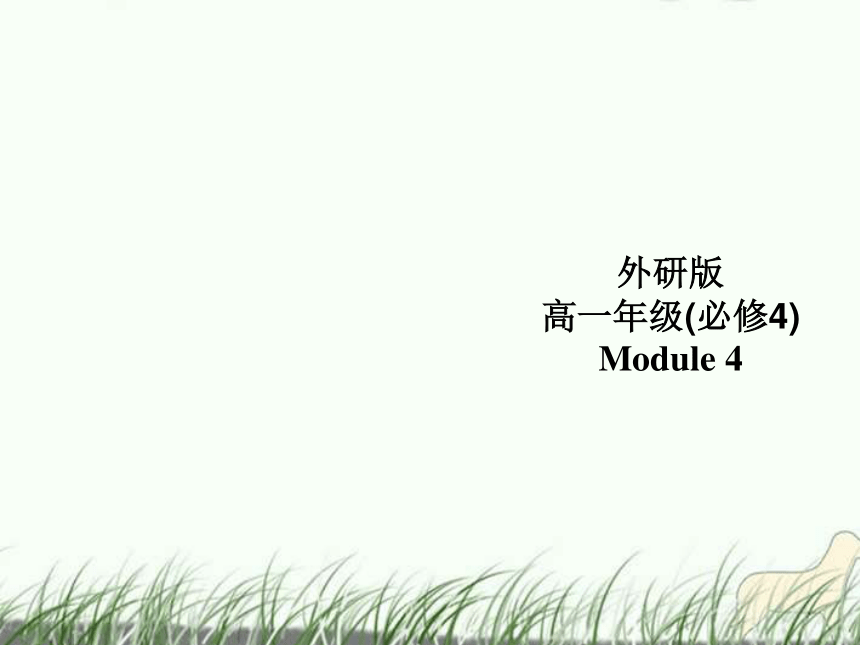
|
|
| 格式 | rar | ||
| 文件大小 | 942.7KB | ||
| 资源类型 | 教案 | ||
| 版本资源 | 外研版 | ||
| 科目 | 英语 | ||
| 更新时间 | 2011-05-20 00:00:00 | ||
图片预览


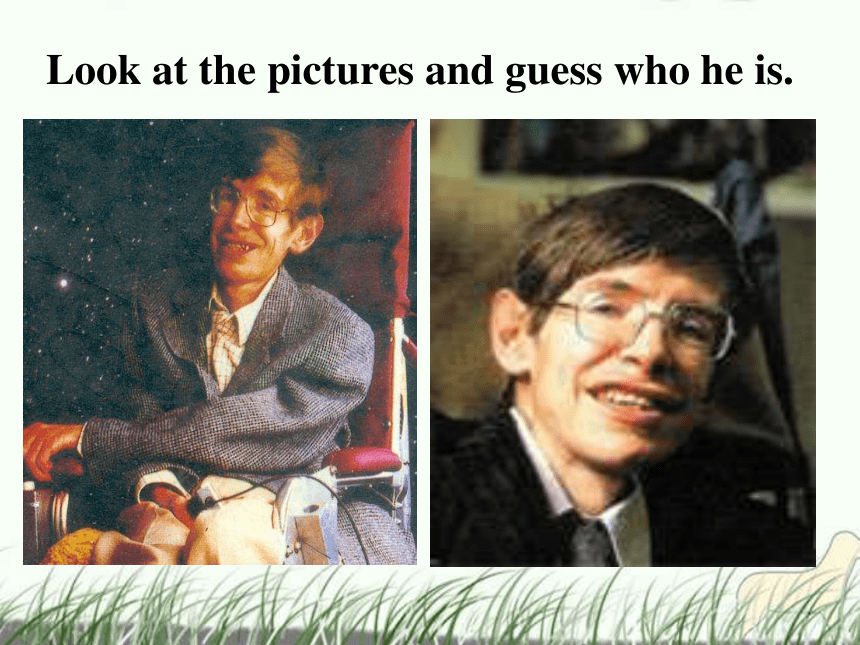
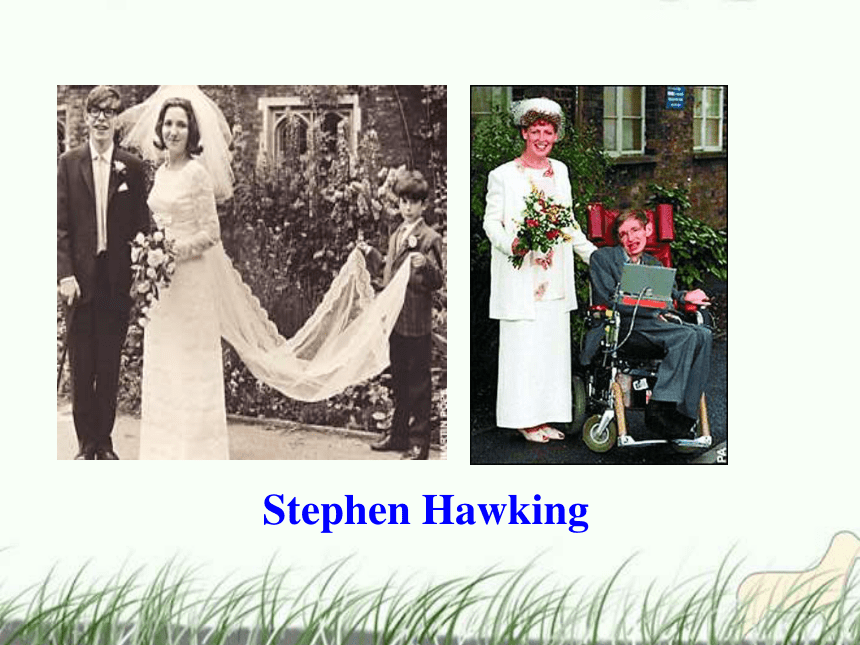
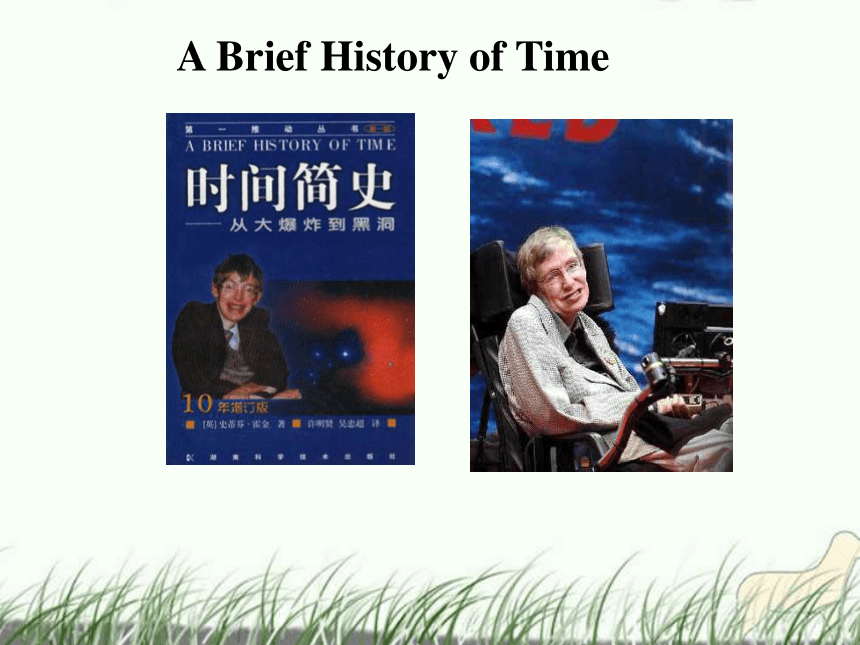
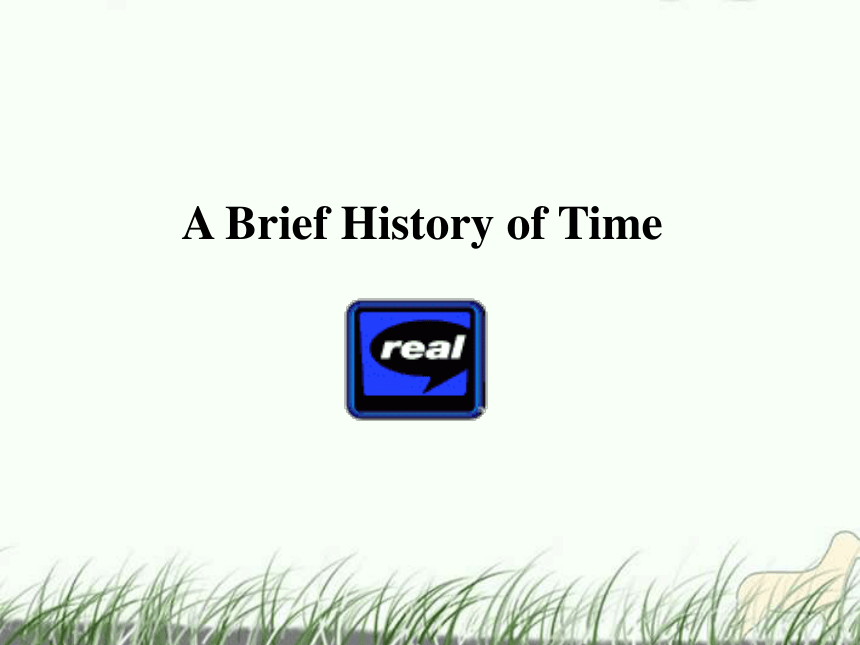
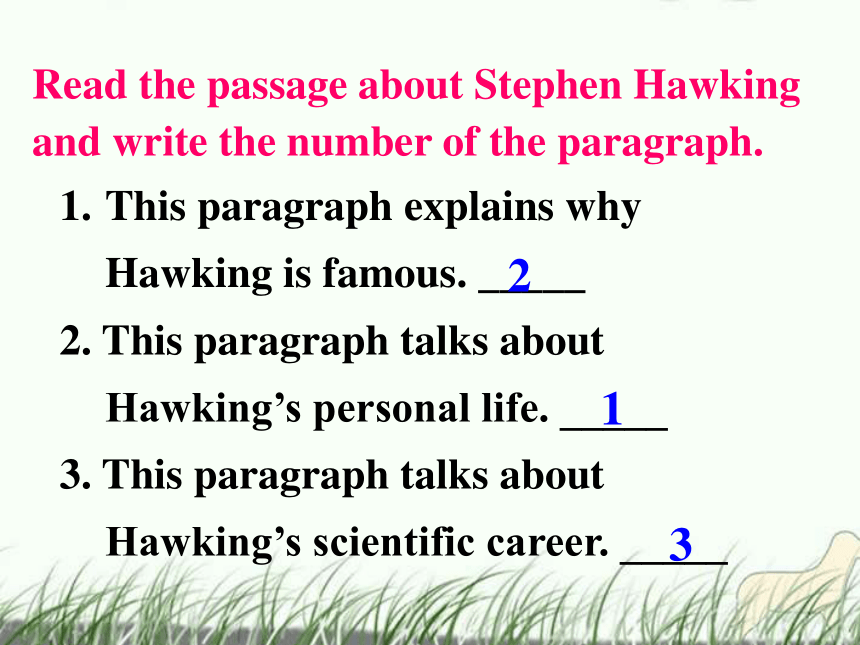
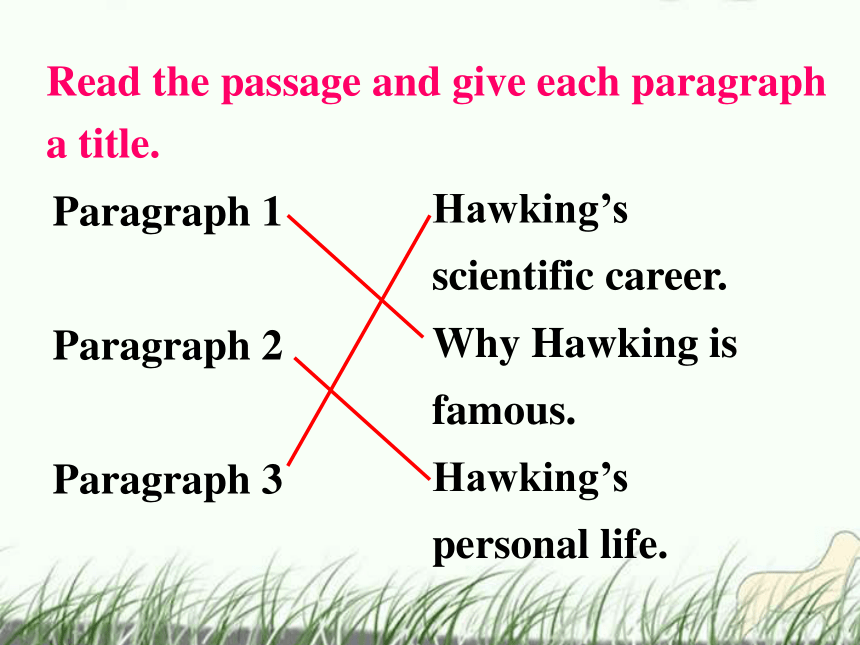
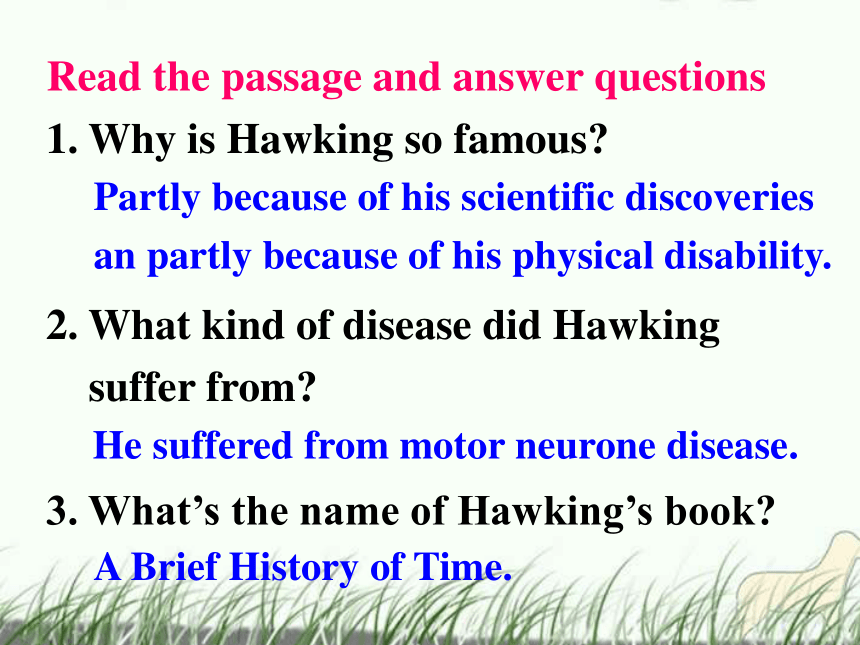
文档简介
(共30张PPT)
外研版
高一年级(必修4)
Module 4
Reading and Cultural Corner
Look at the pictures and guess who he is.
Stephen Hawking
A Brief History of Time
A Brief History of Time
Read the passage about Stephen Hawking
and write the number of the paragraph.
This paragraph explains why Hawking is famous. _____
2. This paragraph talks about Hawking’s personal life. _____
3. This paragraph talks about Hawking’s scientific career. _____
2
3
1
Read the passage and give each paragraph a title.
Paragraph 1
Paragraph 2
Paragraph 3
Hawking’s
scientific career.
Why Hawking is famous.
Hawking’s
personal life.
Read the passage and answer questions
1. Why is Hawking so famous
2. What kind of disease did Hawking suffer from
3. What’s the name of Hawking’s book
Partly because of his scientific discoveries an partly because of his physical disability.
He suffered from motor neurone disease.
A Brief History of Time.
Appreciate the beautiful sentences. Then remember them.
It was discovered that he was a brilliant scientist.
2. Moving in a wheelchair and speaking through a special computer, he has become the voice of science.
3. Stephen Hawking has spent his career at Cambridge University, where he became Professor of Physics in 1977.
According to the notes, say something
about Stephen Hawking.
One of the most famous scientists…
Because of … because of…
Be born… graduated…
In the 1960s…
Became the voice of science
Became Professor of Physics…
His book …
Read the notes about Albert Einstein.
Talk about how to write a passage about Albert Einstein using the notes.
Begin like this:
Albert Einstein was probably the most brilliant scientist of the twentieth century.
Albert Einstein was probably the most brilliant scientist of the twentieth century. Born in Ulm, Germany 1879, he didn’t speak until he was three, but then developed a strong interest in Mathematics as a child.
Model answer:
He had the idea for his Theory of Relativity at the age of 16, although he didn’t publish it until 1905, after he had studied Physics in Zurich, Switzerland.
单词拼写:
I’m afraid your name e_____ me. 2. He was d________ with cancer. 3. He is one of the v_____ of this accident. 4. As a scientist, he is very b______.
scapes
iagnosed
ictims
rilliant
5. Give me a ____ (简洁的) introduction of this machine.
6. The smoke rose _______ (笔直地)
7. After the ________ (爆炸), many things disappeared.
8. Do you know how to use ______ (箭)?
brief
straight
explosion
arrows
ROCKETS
Read the passage quickly and find the answers to the questions.
1. How were rockets invented
By accident--- when people threw bamboo tubes with gunpowder inside into the fire to make explosions and saw that some of them flew into the air.
2. What are they used for today
They are used to send astronauts into space and in firework displays.
Appreciate the following sentences and remember them.
Today rockets are very advanced machines which we can use to send astronauts into space.
2. The Chinese discovered that the gas escaping from the tube could lift it into the air.
3. The tubes were attached to a long stick which helped keep the rocket moving in a straight direction.
Wan Hu who invented the flying chair
Give a description of Wan Hu’s flying chair according to the picture. Using the words below.
attached …to … two kites chair rockets
Discussion
What do you think the future rockets will be Write down your imagination and share with your classmates.
课堂精练
You should put the __ theory into practice. A. advance B. advanced C. advancing D. advancedly
2. I don’t think the telephone was invented ___. A. by chance B. by a chance C. by accidents D. by an accident
3. Luckily, the little boy escaped ___ in the fighting in the street. A. of being killed B. from being killed C. of killing D. from killing
4. She ___ the room by painting it. A. transformed B. turned C. transported D. made
5. Such ___, you can’t go away. A. is the case B. being the case C. the case D. in the case
根据括号内所给的汉语提示完成下列句子,每空一词。
1. He didn’t break the window on purpose;
in fact, he did it quite __ ________ (意外
地).
2. Ten passengers narrowly escaped _____
_____ (受伤) by the bus crash.
3. Though his plan sounded wonderful,
___ _________ (并非所有人) was in
favor of it.
by accident
being
hurt
not everyone
4. My computer broke down because a
virus ___ _______ __ (附着在) an e-
mail.
5. When I was on my way home, I was
nearly knocked over by a car coming
___ ___ _________ (朝我的方向).
6. The country has been __ ___ ____
(与……交战) its neighbour for two
years.
was attached to
in my direction
at war with
外研版
高一年级(必修4)
Module 4
Reading and Cultural Corner
Look at the pictures and guess who he is.
Stephen Hawking
A Brief History of Time
A Brief History of Time
Read the passage about Stephen Hawking
and write the number of the paragraph.
This paragraph explains why Hawking is famous. _____
2. This paragraph talks about Hawking’s personal life. _____
3. This paragraph talks about Hawking’s scientific career. _____
2
3
1
Read the passage and give each paragraph a title.
Paragraph 1
Paragraph 2
Paragraph 3
Hawking’s
scientific career.
Why Hawking is famous.
Hawking’s
personal life.
Read the passage and answer questions
1. Why is Hawking so famous
2. What kind of disease did Hawking suffer from
3. What’s the name of Hawking’s book
Partly because of his scientific discoveries an partly because of his physical disability.
He suffered from motor neurone disease.
A Brief History of Time.
Appreciate the beautiful sentences. Then remember them.
It was discovered that he was a brilliant scientist.
2. Moving in a wheelchair and speaking through a special computer, he has become the voice of science.
3. Stephen Hawking has spent his career at Cambridge University, where he became Professor of Physics in 1977.
According to the notes, say something
about Stephen Hawking.
One of the most famous scientists…
Because of … because of…
Be born… graduated…
In the 1960s…
Became the voice of science
Became Professor of Physics…
His book …
Read the notes about Albert Einstein.
Talk about how to write a passage about Albert Einstein using the notes.
Begin like this:
Albert Einstein was probably the most brilliant scientist of the twentieth century.
Albert Einstein was probably the most brilliant scientist of the twentieth century. Born in Ulm, Germany 1879, he didn’t speak until he was three, but then developed a strong interest in Mathematics as a child.
Model answer:
He had the idea for his Theory of Relativity at the age of 16, although he didn’t publish it until 1905, after he had studied Physics in Zurich, Switzerland.
单词拼写:
I’m afraid your name e_____ me. 2. He was d________ with cancer. 3. He is one of the v_____ of this accident. 4. As a scientist, he is very b______.
scapes
iagnosed
ictims
rilliant
5. Give me a ____ (简洁的) introduction of this machine.
6. The smoke rose _______ (笔直地)
7. After the ________ (爆炸), many things disappeared.
8. Do you know how to use ______ (箭)?
brief
straight
explosion
arrows
ROCKETS
Read the passage quickly and find the answers to the questions.
1. How were rockets invented
By accident--- when people threw bamboo tubes with gunpowder inside into the fire to make explosions and saw that some of them flew into the air.
2. What are they used for today
They are used to send astronauts into space and in firework displays.
Appreciate the following sentences and remember them.
Today rockets are very advanced machines which we can use to send astronauts into space.
2. The Chinese discovered that the gas escaping from the tube could lift it into the air.
3. The tubes were attached to a long stick which helped keep the rocket moving in a straight direction.
Wan Hu who invented the flying chair
Give a description of Wan Hu’s flying chair according to the picture. Using the words below.
attached …to … two kites chair rockets
Discussion
What do you think the future rockets will be Write down your imagination and share with your classmates.
课堂精练
You should put the __ theory into practice. A. advance B. advanced C. advancing D. advancedly
2. I don’t think the telephone was invented ___. A. by chance B. by a chance C. by accidents D. by an accident
3. Luckily, the little boy escaped ___ in the fighting in the street. A. of being killed B. from being killed C. of killing D. from killing
4. She ___ the room by painting it. A. transformed B. turned C. transported D. made
5. Such ___, you can’t go away. A. is the case B. being the case C. the case D. in the case
根据括号内所给的汉语提示完成下列句子,每空一词。
1. He didn’t break the window on purpose;
in fact, he did it quite __ ________ (意外
地).
2. Ten passengers narrowly escaped _____
_____ (受伤) by the bus crash.
3. Though his plan sounded wonderful,
___ _________ (并非所有人) was in
favor of it.
by accident
being
hurt
not everyone
4. My computer broke down because a
virus ___ _______ __ (附着在) an e-
mail.
5. When I was on my way home, I was
nearly knocked over by a car coming
___ ___ _________ (朝我的方向).
6. The country has been __ ___ ____
(与……交战) its neighbour for two
years.
was attached to
in my direction
at war with
